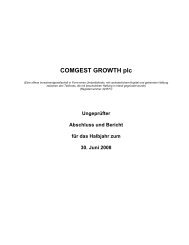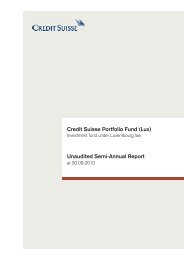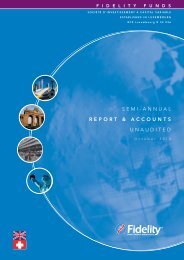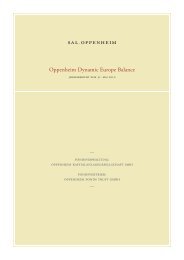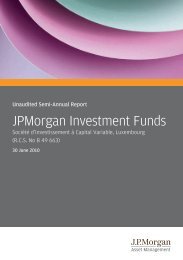Verkaufsprospekt
Verkaufsprospekt
Verkaufsprospekt
Sie wollen auch ein ePaper? Erhöhen Sie die Reichweite Ihrer Titel.
YUMPU macht aus Druck-PDFs automatisch weboptimierte ePaper, die Google liebt.
factors, cause all of such markets to move rapidly in the<br />
same direction because of, among other things, interest<br />
rate fluctuations.<br />
The use of FDI also involves certain special risks, including:-<br />
(1) dependence on the ability to predict movements in<br />
the prices of securities being hedged and movements in<br />
interest rates, (2) imperfect correlation between the price<br />
movements of the derivatives and price movements of<br />
related investments, (3) the fact that skills needed to use<br />
these instruments are different from those needed to select<br />
the Sub-Fund’s securities, (4) the possible absence of a<br />
liquid market for any particular instrument at any particular<br />
time, (5) possible impediments to effective portfolio management<br />
or the ability to meet redemptions, (6) possible<br />
legal risks arising in relation to derivative contract documentation,<br />
particularly issues arising relating to enforceability<br />
of contracts and limitations thereto, (7) settlement<br />
risk as when dealing with futures, forwards, swaps, contracts<br />
for differences the Sub-Fund’s liability may be potentially<br />
unlimited until the position is closed, and (8) counterparty<br />
risk as the use of OTC derivatives, such as futures,<br />
forward contracts, swap agreements and contracts for<br />
differences will expose the Sub-Fund to credit risk with<br />
respect to the counterparty involved.<br />
Investment in the FDI outlined above by the Sub-Fund may<br />
involve the assumption of obligations as well as rights and<br />
assets. Assets deposited as margin with brokers may not<br />
be held in segregated accounts by the brokers and may<br />
therefore become available to the creditors of such brokers<br />
in the event of their insolvency or bankruptcy.<br />
The Sub-Fund may from time to time utilise both exchange-traded<br />
and OTC credit derivatives as part of its<br />
investment policy and for hedging purposes. These instruments<br />
may be volatile, involve certain special risks and<br />
expose investors to a high risk of loss. When used for<br />
hedging purposes there may be an imperfect correlation<br />
between these instruments and the underlying investments<br />
or market sectors being hedged. Transactions in OTC<br />
derivatives, such as credit derivatives, may involve additional<br />
risk as there is no exchange market on which to<br />
close out an open position.<br />
Fixed Income Securities: Investment in fixed income<br />
securities is subject to interest rate, sector, security and<br />
credit risks. Lower-rated securities will usually offer higher<br />
yields than higher-rated securities to compensate for the<br />
reduced creditworthiness and increased risk of default that<br />
these securities carry. Lower-rated securities generally<br />
tend to reflect short-term corporate and market developments<br />
to a greater extent than higher-rated securities<br />
which respond primarily to fluctuations in the general level<br />
of interest rates. There are fewer investors in lower-rated<br />
securities and it may be harder to buy and sell such securities<br />
at an optimum time.<br />
The volume of transactions effected in certain international<br />
bond markets may be appreciably below that of the world’s<br />
largest markets, such as the United States. Accordingly,<br />
the Sub-Fund’s investment in such markets may be less<br />
liquid and their prices may be more volatile than comparable<br />
investments in securities trading in markets with larger<br />
trading volumes. Moreover, the settlement periods in cer-<br />
PineBridge Global Emerging Markets Corporate Bond Fund<br />
tain markets may be longer than in others which may affect<br />
portfolio liquidity.<br />
Investment grade securities may be subject to the risk of<br />
being downgraded to a rating that is below investment<br />
grade.<br />
Unitholders should note that where investment grade securities<br />
are downgraded to a rating that is below investment<br />
grade after acquisition, there is no specific requirement to<br />
sell such securities unless otherwise stated in the investment<br />
policy outlined above in this Supplement. In the event<br />
of such downgrading, the Manager or its delegates will<br />
promptly analyse such securities and the financials of the<br />
issuer of such securities to determine the action to be<br />
taken (i.e. hold, reduce or buy).<br />
Many fixed income securities especially those issued at<br />
high interest rates provide that the issuer may repay them<br />
early. Issuers often exercise this right when interest rates<br />
decline. Accordingly, holders of securities that are pre-paid<br />
may not benefit fully from the increase in value that other<br />
fixed income securities experience when rates decline.<br />
Furthermore, in such a scenario the Sub-Fund may reinvest<br />
the proceeds of the pay-off at the then current<br />
yields, which will be lower than those paid by the security<br />
that was paid off. Pre-payments may cause losses on<br />
securities purchased at a premium, and unscheduled prepayments,<br />
which will be made at par, will cause the Sub-<br />
Fund to experience loss equal to any unamortized premium.<br />
An investment in sovereign debt securities, including, but<br />
not limited to, those issued by sovereign / government<br />
bodies of countries in the Eurozone, may be subject to<br />
credit and / or default risks. Particularly high (or increasing)<br />
levels of government fiscal deficit and / or high levels of<br />
government debts, amongst other factors, may adversely<br />
affect the credit rating of such sovereign debt securities<br />
and may lead to market concerns of higher default risk. In<br />
the unlikely event of downgrading or default, the value of<br />
such securities may be adversely affected resulting in the<br />
loss of some or all of the sums invested in such securities.<br />
Credit Default Swaps: When the Sub-Fund is the buyer of<br />
a credit default swap, it would be entitled to receive the<br />
agreed-upon value (or par) of a referenced debt obligation<br />
from the counterparty to the swap on the occurrence of<br />
certain credit events in relation to the relevant reference<br />
entity. As consideration, the Sub-Fund would pay to the<br />
counterparty a periodic stream of fixed payments during<br />
the life of the swap if no credit event has occurred, in<br />
which case the Sub-Fund would receive no benefits under<br />
the swap. In circumstances in which the Sub-Fund does<br />
not own the debt securities that are deliverable under a<br />
credit default swap, the Sub-Fund is exposed to the risk<br />
that deliverable securities will not be available in the market,<br />
or will be available only at unfavourable prices. In<br />
certain instances of issuer defaults or restructurings, it has<br />
been unclear under the standard industry documentation<br />
for credit default swaps whether or not a "credit event"<br />
triggering the seller's payment obligation had occurred. In<br />
either of these cases, the Sub-Fund would not be able to<br />
realize the full value of the credit default swap upon a<br />
default by the reference entity. As a seller of credit default<br />
| 249



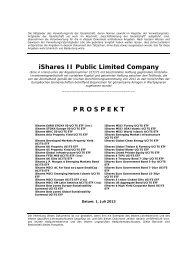
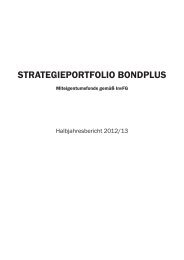
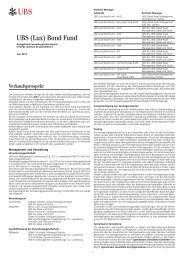
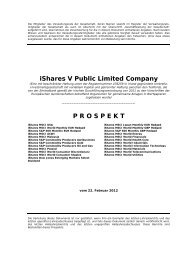
![Prospectus Simplifié daté de [Mars] 2005](https://img.yumpu.com/18875582/1/190x245/prospectus-simplifie-date-de-mars-2005.jpg?quality=85)
